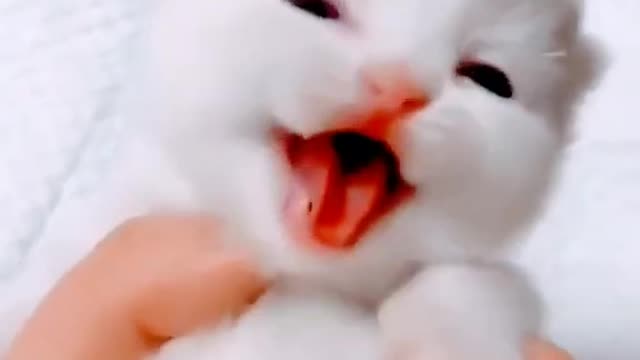Premium Only Content

Cute Cat Baby sound is heart touching
Think your cat’s meows, chirps, yowls, and purrs are just random gibberish? Think again. She’s actually communicating to you information about her world and about how she feels toward you. The good news is that if you listen closely, you just might begin to understand what the sounds your cat makes is all about and use that understanding to your advantage.
Next to birds, cats possess the widest range of vocalizations of any domestic pet. Though best known for their meows, purrs, hisses, and growls, the list of sounds they regularly make is more comprehensive than this. Depending on the situation, your cat is capable of making many distinct utterances, with multiple nuanced variations of each, according to importance. Some reflect contentment and ease, while others expose worry, fear, or even anger. All, though, are indicative of your cat’s emotional state of mind.Meow
Perhaps the most commonly heard cat sound, the meow of an adult cat is almost exclusively used to communicate with humans, and not other cats. First uttered by kittens when in need of their mothers, this juvenile vocalization fades away as wild cats mature. But, as cats in domesticity tend to think of themselves as our eternal offspring, they maintain this endearing vocalization throughout their adult lives. Generally, a meowing cat wants something—attention or food or perhaps access to a room. Sometimes though, meows simply serve as a “welcome home” salutation.
Occasionally, a meow can signify loneliness or even illness. Older cats often meow more because of failing senses or due to anxiety over not being as nimble as before. In younger cats, the meow often gets shortened to an interrogative “mew?” when lonely or hungry. And the frequency of meowing is an indicator of a cat’s frame of mind; rapid-fire meows mean hey, pay attention to me, I’m talking here!
A longer, more plaintive “meowww” can indicate worry, annoyance, or objection to something. This version will often have a throatier quality to it, almost as if she is saying, “oh, come on.” And incessant meowing could indicate illness or injury; if you suspect this, consider a trip to the veterinarian.
-
 3:12:08
3:12:08
MyronGainesX
13 hours ago $32.56 earnedDan Bongino Named FBI Deputy Director, Trump Meets Macron, And More!
100K31 -
 3:12:31
3:12:31
vivafrei
12 hours agoBarnes Live from Seattle - Defending Benshoof in a Case that is CRAY CRAY!
166K53 -
 2:12:12
2:12:12
Robert Gouveia
13 hours agoLiberals EXPLODE over Elon's Email; Lawsuits FLY; Sanctions?? Congrats Dan!
121K44 -
 1:33:36
1:33:36
Redacted News
13 hours agoBREAKING! PUTIN LAUNCHES MASSIVE OFFENSIVE IN UKRAINE AS EUROPEAN LEADERS PUSH FOR MORE WAR
197K277 -
 44:39
44:39
Kimberly Guilfoyle
14 hours agoBetter Days Ahead for the FBI, Live with Asm Bill Essayli & John Koufos | Ep.199
124K32 -
 1:40:29
1:40:29
In The Litter Box w/ Jewels & Catturd
1 day agoWhat Did You Do Last Week? | In the Litter Box w/ Jewels & Catturd – Ep. 748 – 2/24/2025
159K42 -
 23:34
23:34
Stephen Gardner
13 hours ago🔥CNN PANICS over $5000 DOGE Dividend | Trump Orders bigger Audits
101K169 -
 1:53:54
1:53:54
The White House
15 hours agoPresident Trump Holds a Press Conference with President Emmanuel Macron of France
109K120 -
 1:48:31
1:48:31
The Officer Tatum
16 hours agoLIVE MSNBC DROPS HAMMER On Joy Reid as STAFFERS PANIC! + More Ep 67
138K90 -
 59:36
59:36
Chad Prather
15 hours agoTRUMP TAPS DAN BONGINO TO HELP LEAD FBI - IT’S OVER FOR THE DEEP STATE!
102K73